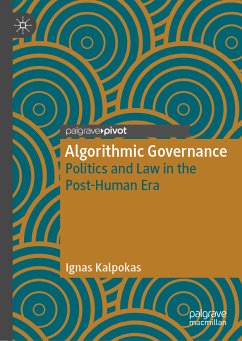This book analyses the changes to the regulation of everyday life that have taken place as a result of datafication, the ever-growing analytical, predictive, and structuring role of algorithms, and the prominence of the platform economy. This new form of regulation - algorithmic governance - ranges from nudging individuals towards predefined outcomes to outright structuration of behaviour through digital architecture. The author reveals the strength and pervasiveness of algorithmic politics through a comparison with the main traditional form of regulation: law. These changes are subsequently demonstrated to reflect a broader shift away from anthropocentric accounts of the world. In doing so, the book adopts a posthumanist framework which focuses on deep embeddedness and interactions between humans, the natural environment, technology, and code.
Ignas Kalpokas is Senior Lecturer of Public Communication at Vytautas Magnus University and Assistant Professor of International Relations and Development at LCC International University, Lithuania. He is the author of Creativity and Limitation in Political Communities (2017) and A Political Theory of Post-Truth (2019).
Dieser Download kann aus rechtlichen Gründen nur mit Rechnungsadresse in A, B, BG, CY, CZ, D, DK, EW, E, FIN, F, GR, HR, H, IRL, I, LT, L, LR, M, NL, PL, P, R, S, SLO, SK ausgeliefert werden.
Es gelten unsere Allgemeinen Geschäftsbedingungen: www.buecher.de/agb
Impressum
www.buecher.de ist ein Internetauftritt der buecher.de internetstores GmbH
Geschäftsführung: Monica Sawhney | Roland Kölbl | Günter Hilger
Sitz der Gesellschaft: Batheyer Straße 115 - 117, 58099 Hagen
Postanschrift: Bürgermeister-Wegele-Str. 12, 86167 Augsburg
Amtsgericht Hagen HRB 13257
Steuernummer: 321/5800/1497
USt-IdNr: DE450055826
Bitte wählen Sie Ihr Anliegen aus.
Rechnungen
Retourenschein anfordern
Bestellstatus
Storno









